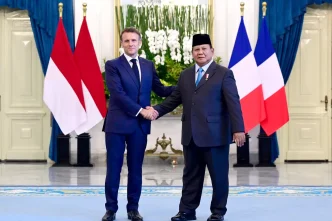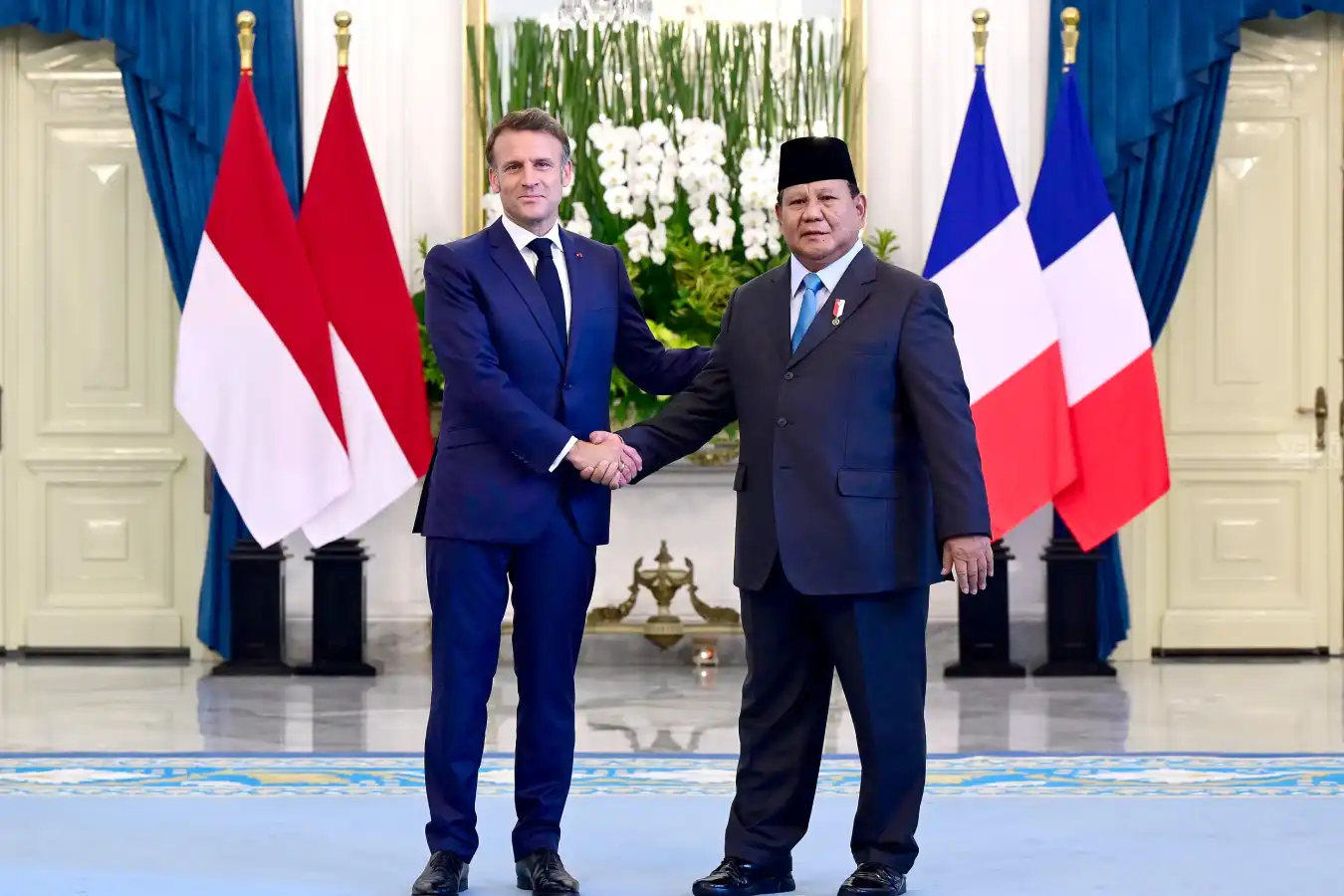Indonesia and France are deepening their diplomatic and strategic partnership, with defence cooperation and energy policies emerging as key pillars of their relationship. As Southeast Asia becomes a focal point for global powers, this evolving bond signals both nations’ intent to navigate regional challenges and opportunities together. Recent discussions between leaders highlight a shared commitment to security and sustainable development, positioning the partnership as a counterbalance to broader geopolitical tensions in the Indo-Pacific.
Defence Cooperation Takes Center Stage
The warming of ties between Jakarta and Paris has been marked by a renewed emphasis on defence collaboration. Both nations are exploring joint military exercises, technology transfers, and potential arms deals as part of a broader strategy to enhance regional stability. A senior Indonesian official noted that such cooperation is vital given the complex security dynamics in the South China Sea, where overlapping territorial claims continue to fuel tensions. “Our partnership with France strengthens our capacity to safeguard national interests” said the official during a recent bilateral meeting.
France, under President Emmanuel Macron, has positioned itself as a reliable partner for Southeast Asian nations, projecting Europe’s commitment to the region. Macron’s vision, articulated during a recent address, emphasizes a balanced approach that avoids aligning too closely with any single global power. “Europe can offer an alternative model of cooperation based on mutual respect and shared goals” he stated, underscoring France’s intent to deepen engagement with countries like Indonesia. This rhetoric aligns with Jakarta’s own foreign policy of non-alignment, making the partnership a natural fit.
Analysts suggest that defence ties could extend to naval cooperation, given France’s expertise in maritime security and Indonesia’s archipelagic geography. While no formal agreements have been signed, discussions around the procurement of French-made military equipment, including submarines and fighter jets, are reportedly underway. If confirmed, such deals could reshape Indonesia’s defence capabilities, though questions remain about the financial implications for a nation already balancing significant domestic spending priorities.
Energy Policies: Green Boon or Climate Risk?
Parallel to defence talks, energy policy has emerged as a critical area of collaboration. Indonesia’s recently unveiled 10-year power procurement plan has sparked debate about its environmental impact, and France’s involvement could tip the balance toward sustainability—or exacerbate existing challenges. The plan, which aims to meet rising energy demands through a mix of renewable and fossil fuel sources, has drawn scrutiny for its heavy reliance on coal in the near term.
France, a leader in nuclear and renewable energy technologies, is poised to offer expertise in transitioning to cleaner power systems. Indonesian policymakers have expressed interest in French investments in solar and wind projects, particularly in remote regions like Kalimantan and Sulawesi, where energy access remains uneven. A French diplomat highlighted the potential for collaboration, stating, “We see Indonesia as a key partner in achieving global climate goals through innovative energy solutions” during a recent forum in Jakarta.
However, environmentalists caution that foreign partnerships must prioritize long-term ecological benefits over short-term economic gains. Critics of the power plan argue that without stricter regulations, international investments risk locking Indonesia into carbon-intensive infrastructure for decades. The tension between economic growth and climate commitments is palpable, with local activists urging the government to leverage French expertise for a decisive shift toward renewables. As one Jakarta-based environmental advocate put it, “This is a chance to redefine our energy future, but only if the focus is truly green”.
Geopolitical Context and Regional Implications
The strengthening of Indonesia-France relations must be viewed within the broader geopolitical landscape of Southeast Asia. As China and the United States vie for influence in the region, smaller powers like Indonesia are increasingly courted by middle powers such as France, which seek to carve out a distinct role. This dynamic offers Jakarta a chance to diversify its international partnerships, reducing reliance on any single ally while amplifying its voice on global issues.
For France, the relationship aligns with its Indo-Pacific strategy, which aims to counterbalance China’s growing presence while reinforcing Europe’s relevance in the region. Macron’s administration has made no secret of its ambition to position France as a mediator in regional disputes, a role that could gain traction through closer ties with Indonesia, the largest economy in ASEAN. Yet, this approach is not without risks, as any perceived overreach could alienate other regional players or draw France into complex local conflicts.
Public sentiment in Indonesia appears cautiously optimistic about the partnership. Social media discussions on platforms like X reflect a mix of hope for economic benefits and concern over potential strings attached to foreign defence deals. Posts from users in Jakarta and Surabaya suggest a desire for transparency in negotiations, with some questioning whether French involvement will genuinely prioritize Indonesian interests. While these views are not representative of the entire population, they underscore the importance of public trust in shaping the trajectory of this bilateral relationship.
Economic Dimensions and Broader Ties
Beyond defence and energy, economic cooperation forms a cornerstone of the Indonesia-France relationship. Trade between the two nations has grown steadily in recent years, with French companies eyeing opportunities in Indonesia’s infrastructure and technology sectors. Conversely, Indonesian exports of palm oil and other commodities remain a significant component of the trade balance, though environmental concerns surrounding deforestation continue to complicate negotiations for broader trade agreements.
One notable area of mutual interest is education and cultural exchange, which both sides see as a foundation for long-term goodwill. France has pledged to increase scholarships for Indonesian students, while cultural initiatives aim to foster greater understanding between the two societies. These softer aspects of diplomacy, while less headline-grabbing than defence or energy deals, are critical to sustaining the partnership over time.
Financial commitments also play a role, with discussions around French loans and grants to support Indonesian development projects. While specific figures remain undisclosed, estimates suggest that funding could run into the hundreds of millions of dollars, with a focus on sustainable urban planning and disaster resilience—key priorities for a nation vulnerable to natural calamities. For instance, a proposed project in Java aims to bolster flood defenses with French technical assistance, at an estimated cost of 2.5 billion Indonesian Rupiah (US$160,000). Such initiatives, if realized, could serve as tangible proof of the partnership’s benefits.
Challenges and Future Outlook
Despite the promise of closer ties, challenges loom on the horizon. Domestic political pressures in both countries could complicate the implementation of joint initiatives. In Indonesia, upcoming elections may shift policy priorities, while in France, Macron’s administration faces scrutiny over its foreign policy spending amid domestic economic concerns. Balancing these internal dynamics with international ambitions will test the resilience of the partnership.
Moreover, the broader regional context adds layers of complexity. Indonesia must navigate its role within ASEAN, ensuring that bilateral deals with France do not undermine collective regional goals. Similarly, France must avoid perceptions of neocolonialism, a sensitive issue in a region with a history of foreign intervention. Both nations will need to tread carefully to maintain the momentum of their relationship without alienating key stakeholders.
As Indonesia and France chart the next steps in their partnership, the stakes are high for both sides. For Jakarta, the collaboration offers a chance to bolster its strategic and economic standing in an increasingly contested region. For Paris, it represents an opportunity to cement Europe’s relevance in the Indo-Pacific. Whether this alliance can deliver on its potential remains an open question, but early signs suggest a shared determination to make it work. As one Indonesian commentator noted, “This is more than a partnership—it’s a test of how we define our future on the global stage”.
















